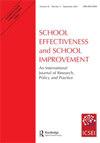农村学校的数据使用过程:破坏领导机会和教学变革的管理结构
IF 2.8
3区 教育学
Q1 EDUCATION & EDUCATIONAL RESEARCH
引用次数: 3
摘要
摘要数据使用已经成为世界各地教育系统的优先事项,因为人们相信合理的教学决策可以根据个人学习者的需求进行调整。尽管人们对校长成为教学领导者的期望越来越高,但几乎没有证据表明,他们——或其他系统或学校领导者——除了确保教师使用数据的结构到位之外,还有其他责任。在这项研究中,我们分析了在美国一个农村学区的四所小学一学年期间收集的访谈和观察数据。我们通过集体领导力的概念框架来考虑结果,以了解地区、学校和课堂层面的领导者如何支持或不支持学校系统中的数据使用。在我们的发现中,数据使用得到了支持和描述,但通常没有得到支持。数据团队会议和结构植根于学校文化中,但它们大多是管理和常规的,将权宜之计和过程置于教学适应或响应之上。因此,我们得出结论,建立数据团队会议和相关结构至关重要,但不足以改善教学和增加学生学习。本文章由计算机程序翻译,如有差异,请以英文原文为准。
Data use processes in rural schools: management structures undermining leadership opportunities and instructional change
ABSTRACT Data use has become a priority in educational systems throughout the world under the belief that rational instructional decisions can be tailored to individual learner needs. Despite increasing expectations for school principals to be instructional leaders, there is little evidence that they – or other system or school leaders – are responsible for anything more than ensuring structures are in place for teachers to work with data. In this study, we analyze interview and observational data collected over the period of 1 academic year in four elementary schools in one rural school district in the United States. We consider results through a conceptual framing of collective leadership to understand how leaders across district, school, and classroom levels do or do not support data use in the school system. Among our findings, data use is espoused and portrayed but generally unsupported. Data team meetings and structures are embedded in school cultures, but they are mostly managed and routine, prioritizing expediency and process over instructional adaptation or response. As a result, we conclude that the establishment of data team meetings and related structures is critical but insufficient to improve instruction and increase student learning.
求助全文
通过发布文献求助,成功后即可免费获取论文全文。
去求助
来源期刊

School Effectiveness and School Improvement
EDUCATION & EDUCATIONAL RESEARCH-
CiteScore
6.60
自引率
0.00%
发文量
23
期刊介绍:
School Effectiveness and School Improvement presents information on educational effectiveness, practice and policy-making across primary, secondary and higher education. The Editors believe that the educational progress of all students, regardless of family background and economic status, is the key indicator of effectiveness and improvement in schools. The journal strives to explore this idea with manuscripts that cover a range of subjects within the area of educational effectiveness at the classroom, school or system level, including, but not limited to: •Effective pedagogy •Classroom climate •School ethos and leadership •School improvement and reform programmes •Systemwide policy and reform
 求助内容:
求助内容: 应助结果提醒方式:
应助结果提醒方式:


